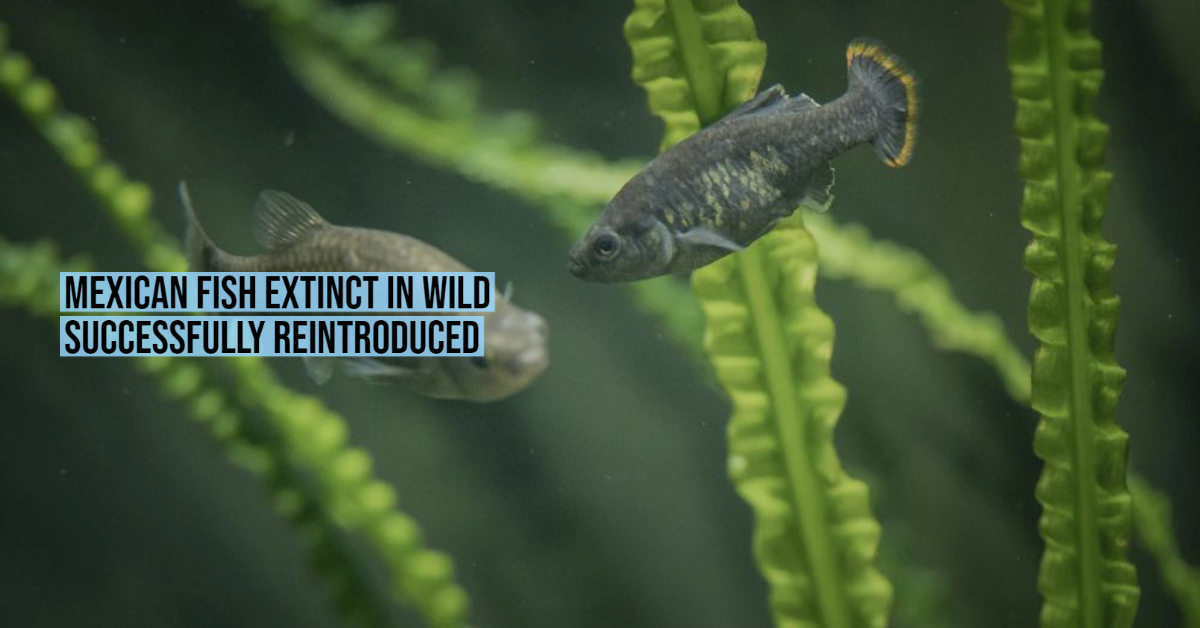There once was a small fish called “tequila splitfin” or “zoogoneticus tequila” that swam in a river in western Mexico, but disappeared in the 1990s. Scientists and residents, however, have achieved the return of a species extinct in nature — but conserved in captivity — to its native habitat.
Its success is now intertwined with the community’s identity and being touted internationally.
It began more than two decades ago in Teuchitlán, a town near the Tequila volcano. A half-dozen students, among them Omar Domínguez, began to worry about the little fish that fit in the palm of a hand and had only ever been seen in the Teuchitlán river. It had vanished from local waters, apparently due to pollution, human activities and the introduction of non-native species.
Domínguez, now a 47-year-old researcher at the University of Michoacán, says that then only the elderly remembered the fish called “gallito” or “little rooster” because of its orange tail.
In 1998, conservationists from the Chester Zoo in England and other European institutions arrived to help set up a laboratory for conserving Mexican fish. They brought several pairs of tequila splitfin fish from the aquariums of collectors, Domínguez said.
The fish began reproducing in aquariums and within a few years Domínguez and his colleagues gambled on reintroducing them to the Teuchitlán river. “They told us it was impossible, (that) when we returned them they were going to die.”
So they looked for options. They built an artificial pond for a semi-captivity stage and in 2012 they put 40 pairs there.
Two years later, there were some 10,000 fish. The result guaranteed funding, not only from the Chester Zoo but also a dozen organizations from Europe, the United States and the United Arab Emirates, to move the experiment to the river.
There they studied parasites, microorganisms in the water, the interaction with predators, competition with other fish, and then introduced the fish in floating cages.
The goal was to re-establish the fragile equilibrium. For that part, the key was not so much the scientists as the local residents.
“When I started the environmental education program I thought they were going to turn a deaf ear to us … and at first that happened,” Domínguez said.
But the conservationists succeeded with patience and years of puppet shows, games and explanations about the ecological and health value of “zoogoneticus tequila” — the fish help control mosquitos that spread dengue.
Some residents made up a nickname for the little fish: “Zoogy.” They made caricatures and formed the “River Guardians,” a group mostly of children. They collect garbage, clean the river and remove invasive plants.
Domínguez said it is difficult to say if water quality is better because there is no previous data to compare, but the entire ecosystem has improved. The river is cleaner, there are fewer non-native species and cattle are no longer permitted to drink in some areas.
The fish rapidly multiplied inside their floating cages. Then they were marked so they could be followed and set free. It was late 2017 and in six months the population increased 55%. Last month, the fish had expanded to another part of the river.
The reintroduction into nature of species that were extinct in the wild is complex and time-consuming. Przewalski’s horse and the Arabian oryx are among successful examples. The Chester Zoo said Dec. 29 that the tequila splitfin had joined that small group.
“The project has been cited as an International Union for the Conservation of Nature (IUCN) case study for successful global reintroductions – with recent scientific studies confirming the fish are thriving and already breeding in the river,″ the zoo said in a statement.
“This is an important moment in the battle for species conservation,” said Gerardo García, the zoo’s curator of lower vertebrates and invertebrates.
The IUCN’s red list of threatened species lists the tequila splitfin as endangered. Mexico’s freshwater ecosystems are under pressure from pollution, over-extraction of water resources and other factors. More than one-third of 536 species of freshwater fish that were assessed in the country are threatened with extinction, according to a 2020 report led by the IUCN and the ABQ BioPark in the United States.
Still, in Mexico, Domínguez and his team are already beginning work on another fish that is considered extinct in the wild: the “skiffia francesae.” The Golden Skiffia could someday join “Zoogy” in the Teuchitlán river.
There once was a small fish called “tequila splitfin” or “zoogoneticus tequila” that swam in a river in western Mexico, but disappeared in the . . .












